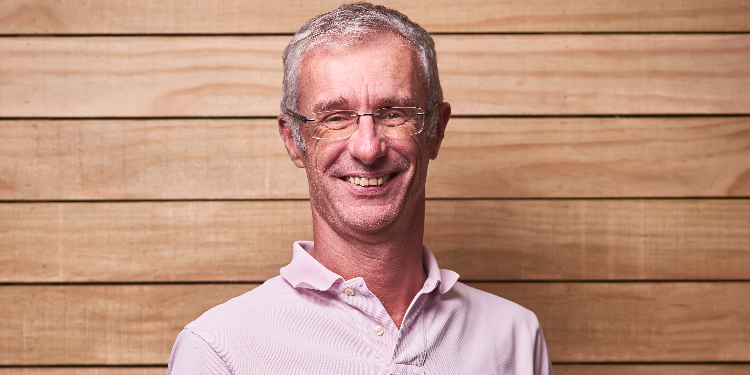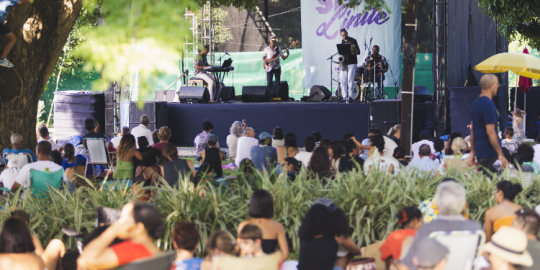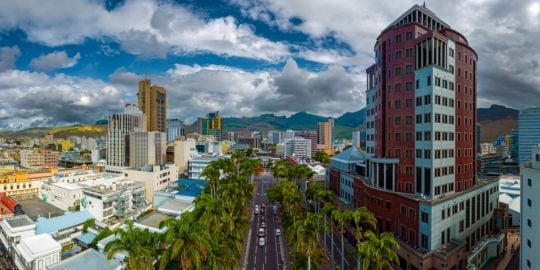Can you introduce yourself and tell us about your background?
I am Marc Israël, French, and I have lived in Mauritius for 21 years, more precisely in Roches Noires. I arrived here in 2020. In France, I was a business manager, and I joined Microsoft in 2001. When I arrived in Mauritius, I had the opportunity to create my first consulting company.
I consider myself a “global citizen”. I like to travel and meet people. I have travelled to more than 70 countries. I have been the Chief Executive Officer (CEO) for Microsoft Africa for several years. So I have spent a lot of time in Africa, except for a few countries in Central Africa.
In Mauritius, I met Jason and Gerald, and the three of us decided to set up a podcast to talk about African entrepreneurship and innovation in Africa. Jason is a Kenyan who has lived in Mauritius for several years now. He works for the ENL group and is the head of a start-up in the education field. Gerald is a Mauritian who has set up a start-up in tourism, a sector that, unfortunately, has been significantly affected by the crisis. Together, we launched a small company producing this podcast. I am also a start-up coach, which means that I support developing start-ups.
What are the themes discussed on this podcast, and what is the target?
Jason, Gerald and I are heavy podcast consumers. Honestly, I don't watch TV anymore, and I haven't listened to the radio for many years. At the same time, I download a lot of media, including podcasts. All three of us came to the same conclusions. First, business is not done the same way in Mauritius or other African countries as in the United States, Europe or Asia. Starting a business is, most of the time, about finding customers, making profits, etc. But the time concept is not the same; neither are business and individual relationships. There are plenty of subtle differences in doing business in Mauritius and Africa compared to other parts of the world. Second, there is a lot of frustration about the difficulty in finding accurate information. There are many podcasts on entrepreneurship and the functional part, but I tend to feel out of place all the time. For example, people who create start-ups in the Silicon Valley can only talk in millions of dollars and millions of users. Still, plenty of small and dynamic businesses can go a long way, and I'm not sure they have much to learn from these start-ups and large companies. I had the opportunity to work in a large company, and I was also frustrated by the American reality. So we decided to launch a podcast for African entrepreneurs to motivate them and give them ideas by confronting real, local experiences. We launched the podcast last year during the lockdown with the idea of interviewing entrepreneurs, including those who had just started, others who already had a business, and people who intervene in the start-ups ecosystem. We tried to create an address book to meet these people and interview them on a range of topics relating to entrepreneurship. We have a 30-minute podcast on Monday and a debriefing on Friday. These are intended for entrepreneurs and people who are wondering how to get started.
What is your main audience?
Interestingly, 48% of our audience is in Africa. But there are 24% in Europe and 18% in the United States. So there are many Africans and people from the Mauritian diaspora but also entrepreneurs and companies with different origins, including Canada and Israel.
In your opinion, what are the main differences in doing business in Mauritius and Africa compared to the rest of the world?
First, the time concept is totally different. "African time" is one of the main subtleties. Time does not flow at the same speed in African countries as it does in the rest of the world. This does not mean that they don't get things done. The frenzy of large economies, including Lagos, Nairobi or Mauritius, since a few years, is almost non-existent in most African countries. The people there do not hesitate to slow down and enjoy life rather than just working. Another difference, in my opinion, is that the cultural impact in Mauritius and Africa is greater. Mauritius, for example, is an island where you cannot do whatever you want. If you go there believing that you are going to teach the Mauritians how to do business, you will end up leaving earlier. It is therefore essential to understand the culture if you want to do business and have meaningful connections. The same applies to Europe and the United States. You have to realise that business is not done in the same way in New York City as in Houston, for example. There are micro-markets everywhere, and all this must be taken into account. In Nigeria and Ivory Coast, for example, there is an almost tribal sub-level, in a good sense. Very often, it is not explicit, so you have to crack the. It takes time, of course, but this seems essential to me in island economies like Mauritius.
As a start-up coach, how do you help people who want to start a business in Mauritius?
I mainly help them to structure their business. When you start a business, you tend to read a lot, and you get a lot of ideas. But there are so many things you won't even think of until you are confronted with reality. Some mistakes can be fatal, so you should avoid making them. I try to support them in the organisation process. We also do this through Entrepreneurs Talk Africa. I also have an “on early stage” investment company called Mo Angels. Currently, we have around twenty members, and we invest in start-ups in Mauritius and Africa. This company has existed for a little less than a year and has studied more than 70 cases, invested in 3 companies and is following 4 others. These are relatively long processes, but they allow companies to get support in the long run. An investment in a start-up can last 20 years. Often, these people have set up a business and need finances to boost their business. We realised that people have a lot to share, and we try to support them through this platform. A lot of companies have an extraordinary impact, but that hardly anyone knows about them.
What types of profiles have you dealt with so far?
Most people who get in touch with us are already here, often Mauritian or African entrepreneurs. But lately, we have been contacted by people who are not in the region. For example, a Mauritian expat living in Australia and who has set up a flourishing company in Sydney is considering business prospects in Mauritius.
In your opinion, are Mauritius and Africa still attractive for business in the COVID-19 era?
It's a fact that Foreign Direct Investment (FDI) in Mauritius has dropped dramatically over the past year. But I am confident the world will bounce back. From October 1, with the reopening of the borders, we shall see how things improve. At the same time, considering what happened in South Africa, a leading African economy, during the lockdown, it's clear that Africa's attractiveness has taken a blow. The South African economy is still struggling. On the other hand, today, people tend to look closer to home than miles away. However, the appetite for external resources still exists, even though things will be done differently from now. We currently have more Africans considering Mauritius and Mauritians who are considering southern Africa because these are closer than Europe, for example. There has been a change of focus.
According to you, which sectors are most sought-after by entrepreneurs in the region?
Today, we have a bit of “online business”, including web and mobile apps, from what I observed in the incubator with which I work. Some companies are also considering the local manufacturing industry, mainly agritech (develop local agriculture, including aquaculture and livestock), to achieve food self-sufficiency and reduce dependency on exports, given the prices, FOREX, etc.
How do you see the future of entrepreneurship in African?
We had more than a hundred calls for projects during the last incubation period at La Turbine, but we only retained a dozen due to insufficient time and resources. Moreover, we do not have the skills and the infrastructure to take more. We are also working on a blue economy project and have already received many requests. So I am very optimistic because there are plenty of opportunities. Even though I have worked in large companies, I am a fan of SMEs (small and medium-sized enterprises), and I believe that wealth is created by individuals.

















Contact us to be featured in the Interviews section.
Participate